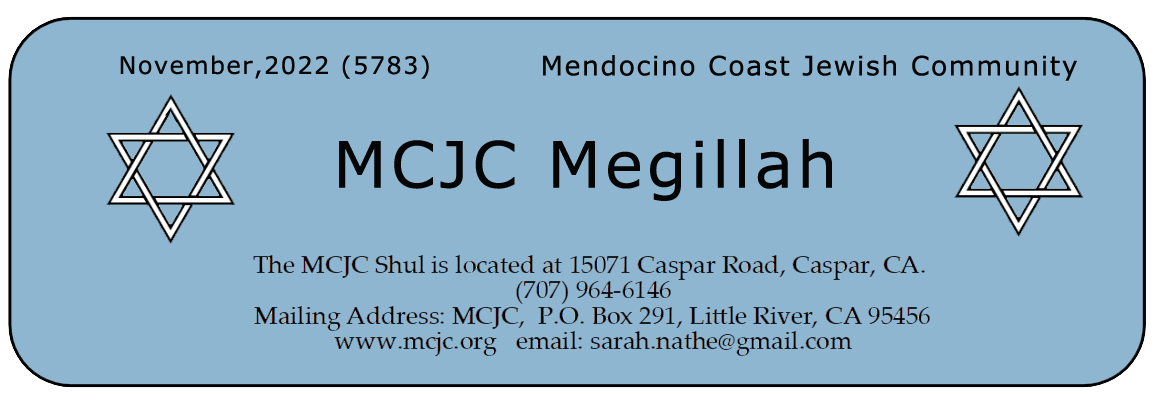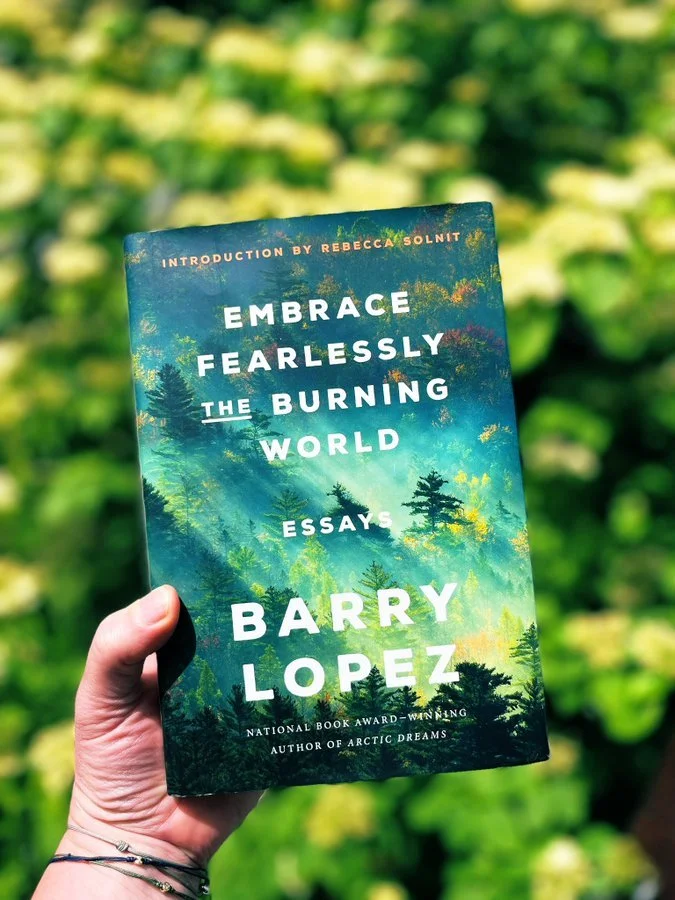November, 2022 Megillah
RABBI'S NOTES
I’ve been in New York this past week, taking my customary post-High Holy Day break. I imagine that a lot of the people I sit next to on the subway would be very happy to get away to a week in Mendocino. But I’ve always loved the vibrancy and all-around excessiveness of Manhattan, and I’m here to soak it up.
Maybe I’ve been trying too hard this visit, but I’ve been aware of spending a little too much time trudging between one cool place and the next, or googling “What to do in New York today” over and over. Or maybe, in my post-Mickey life, my capacity to jump headlong into fun and excitement is still a bit withered.
Then, on my last day in the city, late in the afternoon, I walked about a million miles and ended up at one of the last places on my to-do list: the Museum of Reclaimed Urban Spaces, way out east on Avenue C. For some reason, it was closed during its open hours, and it was starting to rain. I crossed the avenue to look at a garden, walked in a gate, and there was the most beautiful community garden I’ve ever seen! The 9th Street Community Garden & Park features a koi pond, still-blooming dahlias, big trees, every kind of fanciful awning, seating place, and something that looked like a homegrown coffee bar right in the middle. Oh my! There was what looked like a little party going on under one awning. I sat a little distance from the gathering and just gazed around. Someone from the party got up, walked over to me, and handed me a cup of a warm drink that turned out to be hot cider.
A smiley older woman, Puerto Rican, was joshing with an older guy, also with an island accent. They came and sat next to me and started to schmooze. They told me the history of the garden, showed me the spots they had designed and cared for. Pretty soon we were laughing in the rain, and I was completely happy.
After that, I went up the Hudson River Valley (with the fabulous Amy Katz, who used to live on the coast and is now perched here). I’ve hit peak fall color, and it’s glorious. Walking around in one of the little towns I picked up a book by the nature writer Barry Lopez, whom I’ve always admired without having read much of him. Lopez died in late 2020, and the book I’m holding is called Embrace Fearlessly the Burning World. I feel like I need to read it.
In the bookstore, I start at the end. In the last paragraphs of the book, Lopez, ill with the cancer that will soon take his life, describes bucking up a tree that had fallen on his woodshed and crushed it. He works with a friend, wearing many different braces and other protective gear to keep from getting hurt:
“We’ll waste little energy and do things in the order that will make the best use of our time so we don’t weary too fast. We’ll enjoy each other’s company and lean against our trucks, drinking from thermoses, and we’ll watch fair-weather cumulus clouds scudding overhead, above the crowns of the Douglas firs and hemlocks and cedars, and feel the curious revitalization of physical exertion, the pleasure our mutual dependability, and the gift of life, still, in the waning body.”
As I write this, I am aware that you may be reading it shortly before or after the midterm elections. I’ll be happy to be happily surprised, but I’m trying to prepare myself for outcomes I don’t look forward to. As I do, I keep hearing Mickey’s voice, standing out in our yard, ill with the cancer that will soon take his life, saying (just about every day), “This place is Paradise!” I find myself thinking about that garden in the Lower East Side, across the street from the locked-up museum, and about Barry Lopez and his friend taking pleasure in making firewood from the tree that busted up his shed. And I say to myself, “The portals are everywhere.”
I’m writing this in the week of Parshat Noach in Torah. God just got done creating the world, with its Garden of Eden and all its beautiful creatures. But within a very few generations, God, as it were, looks, as it were, into that gorgeous world, now fouled with corruption, and decides to destroy the whole contraption and start all over (well, almost: if that was really God’s intention, why, then, preserve Noah and the animals?) I think of God’s despondency, looking at all the foulness, willing to flood it all nearly to oblivion. Not that any of us can be compared to the God of Torah, but I imagine that many of us can identify a bit with that God-like feeling of despair and indignation: “How could those people take something so beautiful and ruin it?”
At the end of Noah’s story, God pledges never again to destroy the world with a flood. It seems worth preserving, even with all its potential for distressing outcomes. I wonder why, and as I do, my mind wanders to a Midrash: God is scribing the Torah in black fire on white fire, and Moses asks him, “What’s with those curlicues you’re putting on the top of the letters?” God answers, “Someday after many generations, there will arise a man, Akiba ben Joseph, who will derive heaps of law from every little dash, and it is for his sake that I prepare these little crowns.”
The most powerful piece of Whyte’s essay to me was the suggestion, made by Vanessa de Oliveira Andreotti, an Indigenous Brazilian educator and land rights activist, that we need to “hospice” the earth, which:
“would entail sitting with a system in decline, learning from its history, offering
palliative care, attending to the integrity of the process, dealing with tantrums,
incontinence, anger and hopelessness, ‘cleaning up,’ and clearing the space for
something new. This is unlikely to be a glamorous process.”
Unglamorous, yes, and also, to my ears, so much more realistic. It’s painful to think that we might be called on to “hospice” our world. But I think that might mean to gently care for ruined landscapes, nurture animals and plants away from the brink of extinction, practice slower and more thoughtful consumption of resources. Not totally unlike shmitah values.
I don’t know exactly where this line of thought leads, and I am certainly no expert from reading one essay. I think there is a need for identifying some events and situations as crises, but I am also persuaded that much can run amok when we feel under the gun, literally or figuratively.
For a start, I think it might be worthwhile to just notice crisis thinking when it comes up and to wonder a bit about what it calls forth, in our own guts and souls, in our actions, in the policies we advocate and the voices we lift up.
As we return to the world of plowing and sowing, I’m sort of glad that it starts slowly, with a winter in there before the real action can begin. As we enter this new season and this new year and this new cycle, I wish us all some slowness, some time to deliberate and not to panic. And I wish us all a sense of kinship with all that we sustain and all that sustains us.
PAIGE NOTES
Welcome To Our New Rabbinic Intern
MCJC’s Board of Directors and Rabbi are very happy to welcome our new Rabbinic Intern, Paige Lincenberg. Paige will work with our community for the next nine months. She will reach out to families with children and to younger adults to offer programs that support their needs and interests, as well as augmenting the work of our Chevra Kadisha and Bikkur Cholim, participating in services and holidays, and more.
Many in our community have already experienced Paige’s warmth and thoughtfulness on Zoom or in person.
She is a sixth-year rabbinical student in the Aleph Alliance for Jewish Renewal. She lives on the Coast and, along with her studies, has been leading Torah study and services with our friends at Kol HaEmek in Redwood Valley. She just returned from helping to lead a multi-generational, four-day Sukkot festival with Wilderness Torah. She has also created and offered an earth-based Jewish study experience for children through Wilderness Torah.
Paige is passionate about rooting Jewish experience in the earth, also about building enduring relationships and community across generations. She looks forward to learning from our MCJC community even while she offers her insights and energy to us.





